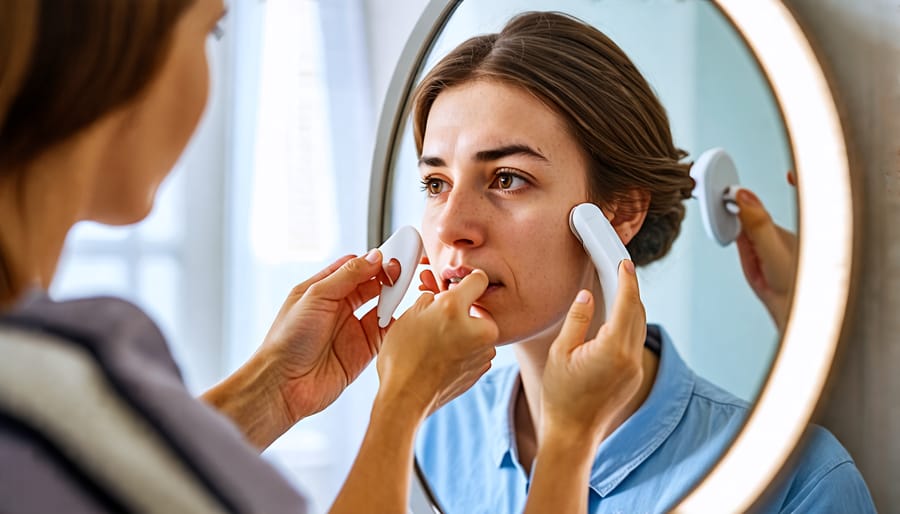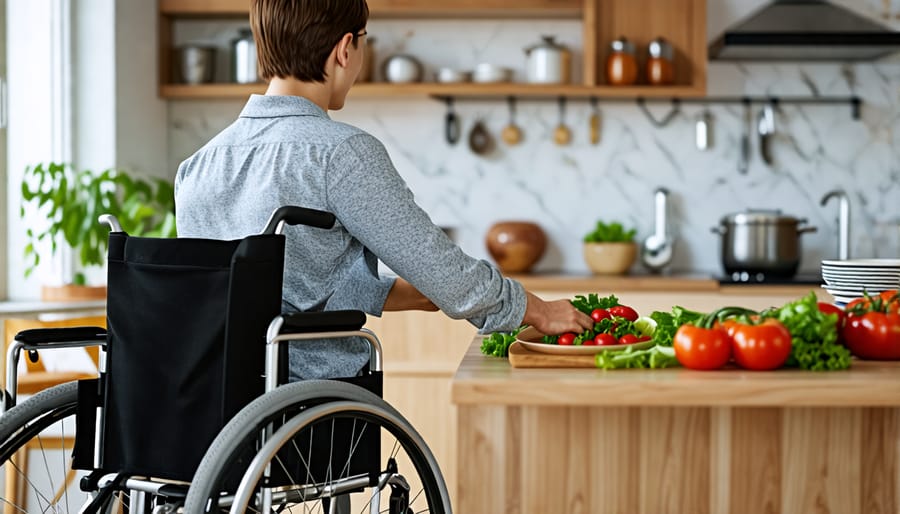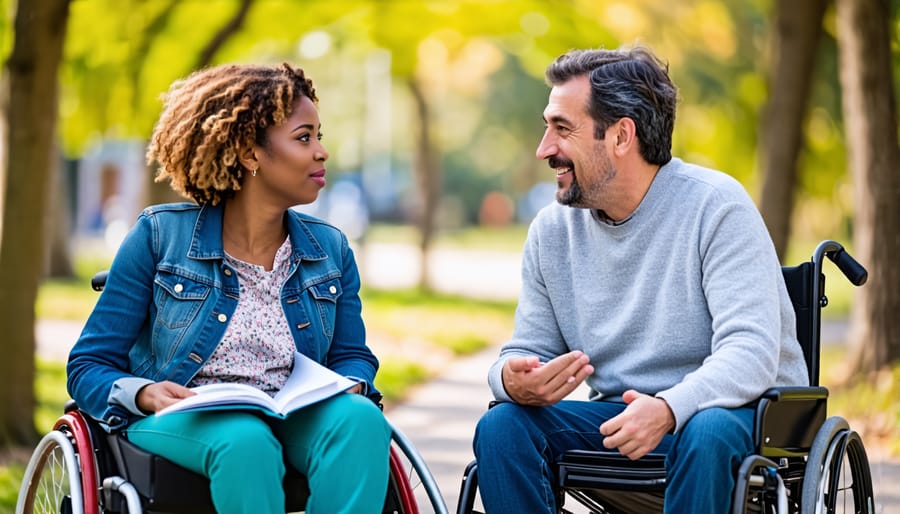
8 Essential Adaptive Living Skills for a More Independent Life
Master the essential adaptive living skills to lead a more independent, fulfilling life. Learn to manage personal finances, including budgeting, banking and paying bills. Develop strong self-care habits for grooming, hygiene and healthy eating. Build interpersonal skills to foster positive relationships and effectively resolve conflicts. Gain practical knowledge for home management tasks like cooking, cleaning and basic repairs.
Personal Hygiene and Grooming
Maintaining personal hygiene is essential for health, self-confidence, and social interactions. For individuals with disabilities or limited mobility, adaptive techniques and assistive devices can make daily grooming tasks more manageable. Long-handled sponges, shower chairs, and grab bars provide stability and reach in the bathroom, while electric toothbrushes and flossers simplify oral care. Button hooks, sock aids, and dressing sticks assist with clothing challenges, and velcro fasteners or magnetic buttons offer easy alternatives to traditional closures. Investing in a handheld showerhead, bath mitt, and wide-tooth comb can also enhance bathing and grooming independence. Occupational therapists can recommend personalized strategies and modifications tailored to individual needs and abilities. By incorporating these adaptive solutions into daily routines, individuals can maintain their personal hygiene with greater ease and autonomy, boosting their overall well-being and quality of life. Remember, small changes and the right tools can make a significant difference in mastering these essential self-care skills.


Meal Planning and Preparation
Meal planning and preparation are essential adaptive living skills that promote healthy eating habits and independence. Start by creating a weekly menu based on your nutritional needs, preferences, and budget. Make a grocery list to ensure you have all the necessary ingredients on hand. When cooking, prioritize simple, nutritious recipes that you enjoy and can prepare with confidence.
Kitchen safety is paramount. Always keep a fire extinguisher nearby and know how to use it. Wear oven mitts when handling hot dishes, and use caution when working with sharp knives. Keep your kitchen clean and organized to prevent accidents and foodborne illnesses. Wash your hands frequently, and properly store perishable items in the refrigerator or freezer.
Adaptive kitchen tools and appliances can make meal preparation more accessible and efficient. Consider using a jar opener for those with limited hand strength, or a large-print kitchen timer for individuals with visual impairments. A slow cooker or instant pot can simplify cooking by allowing you to prepare meals with minimal effort. Invest in a sturdy step stool to safely reach high shelves, and use non-slip mats to keep bowls and cutting boards in place.
By mastering meal planning and preparation skills, you can take control of your diet, save money, and enjoy the satisfaction of creating delicious, homemade meals. Don’t be afraid to experiment with new recipes and techniques, and seek assistance from friends, family, or occupational therapists when needed. With practice and persistence, you’ll develop a repertoire of go-to meals and the confidence to navigate the kitchen with ease.
Housekeeping and Home Maintenance
Maintaining a clean and well-functioning home is essential for independent living. Start by breaking down household tasks into smaller, manageable steps. For laundry, consider using a labeled hamper system to sort clothes by color or fabric type. Front-loading washers and dryers are easier to access, and raised platforms can help with loading and unloading. Invest in adaptive methods and tools like long-handled dusters, lightweight vacuums, and ergonomic mops for cleaning. Organize cleaning supplies in a caddy or cart for easy transport between rooms. For basic repairs, keep a well-stocked toolbox with labeled drawers or compartments. Use color-coded tape or labels to identify different tools and parts. Maintain a list of trusted contractors for more complex repairs. Develop a routine for regular home maintenance tasks like changing air filters, checking smoke detectors, and inspecting plumbing for leaks. Break larger projects into smaller, achievable goals and enlist the help of family or friends when needed. With the right strategies and tools, housekeeping and home maintenance can become more manageable and less overwhelming.
Money Management and Budgeting
Managing money and creating a budget are crucial adaptive living skills for independent living. Start by tracking your income and expenses to get a clear picture of your financial situation. Categorize your spending into necessities like rent, utilities, and groceries, as well as discretionary items like entertainment and dining out. Look for areas where you can cut back and allocate more money to savings or debt repayment.
Create a realistic monthly budget based on your income and expenses, and stick to it as closely as possible. Consider using budgeting apps or spreadsheets to help you stay organized and on track. Set financial goals for yourself, such as building an emergency fund or saving for a major purchase, and adjust your budget accordingly.
Learn how to pay bills on time to avoid late fees and damage to your credit score. Set up automatic payments or reminders to ensure you don’t miss any due dates. Understand how to use a checking and savings account, including writing checks, making deposits, and monitoring your balance to avoid overdrafts.
Improve your banking skills by learning how to use online and mobile banking tools to manage your accounts, pay bills, and transfer money. Stay informed about your bank’s policies and fees, and consider switching to a bank or credit union with lower fees and better benefits if necessary. By mastering these money management and budgeting skills, you’ll be well on your way to financial stability and independence.
Communication and Social Skills
Developing strong communication and social skills is crucial for navigating everyday interactions and maintaining healthy relationships. To improve your communication abilities, focus on active listening, which involves fully concentrating on what the other person is saying and asking relevant questions to show genuine interest. Practice effective communication techniques like using “I” statements to express your feelings and needs clearly and assertively without placing blame or making accusations.
In social situations, be mindful of basic etiquette, such as introducing yourself and others, making eye contact, and using appropriate body language. When conflicts arise, approach them calmly and objectively, seeking to understand the other person’s perspective before expressing your own. Use problem-solving strategies to find mutually beneficial solutions and be willing to compromise when necessary.
To nurture healthy relationships, make time for regular communication and shared activities with friends and family. Show appreciation for their support and be there for them during challenging times. Set clear boundaries when needed and respect the boundaries of others. By continuously working on these skills, you’ll be better equipped to handle a wide range of social situations and build strong, lasting connections with the people in your life.

Time Management and Organization
Effective time management and organization are key to maintaining a productive and stress-free home life. Start by breaking down larger tasks into smaller, manageable steps and prioritizing them based on importance and urgency. Use a planner, calendar, or app to keep track of deadlines, appointments, and to-do lists. Establish a designated place for important documents, bills, and paperwork to avoid clutter and ensure easy access when needed. Develop a regular cleaning and maintenance schedule to keep your living space tidy and functional. Incorporate creating routines for daily tasks like meal planning, laundry, and household chores to streamline your day and reduce decision fatigue. Utilize storage solutions like shelves, bins, and organizers to maximize space and keep items easily accessible. By implementing these strategies and staying organized, you can create a more efficient and enjoyable living environment that supports your daily activities and goals.
Self-Advocacy and Problem-Solving
Self-advocacy and problem-solving skills are vital for independent living. Developing self-awareness is the first step, as it helps you understand your strengths, weaknesses, and needs. This knowledge empowers you to make informed decisions about your life, from daily choices to long-term goals. Setting clear, achievable objectives gives you direction and motivation, while breaking them down into smaller steps makes them more manageable. When faced with challenges, approach them calmly and methodically. Identify the problem, brainstorm potential solutions, and weigh the pros and cons of each option. Don’t be afraid to seek help when needed, but also trust in your ability to find creative solutions. Remember, advocating for yourself is a skill that takes practice. Be patient, persistent, and proud of your progress as you work towards greater independence and self-sufficiency.
Conclusion
In conclusion, adaptive living skills are essential for leading an independent, fulfilling life. By developing skills in self-care, home management, financial literacy, communication, problem-solving, social interaction, self-advocacy, and technology use, individuals can overcome challenges and thrive in their daily lives. Remember, building these skills is a continuous process, and it’s never too late to start. Seek out resources, support, and guidance from family, friends, educators, and professionals to help you along your journey. With dedication and practice, you can master these adaptive living skills and unlock your full potential for a more autonomous and satisfying life.
